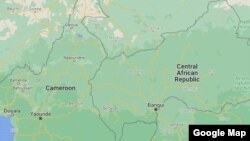Defense ministers from Cameroon and the Central African Republic (CAR) say kidnapping for ransom, cattle theft and illegal arms trafficking continue to hinder security along the border of the neighboring countries. During this week's transborder security meeting in Bouar, a commercial town in the CAR, the defense ministers agreed to jointly deploy troops to protect civilians from rebels fighting to topple the CAR government.
The ministers said they were concerned because rebels and armed groups are increasing transborder criminality and insecurity.
Cameroon Defense Minister Joseph Beti Assomo said economic activity and development have been slowed by increasing insecurity on both sides of the border with the CAR.
Assomo said rebels and armed groups from the CAR regularly attack and seize goods, food and cattle from civilians on both sides of the Cameroon-CAR border. Assomo said civilians are regularly kidnapped for ransom, adding that armed groups are illegally exploiting wood and minerals, especially gold from border villages.
Assomo said the transborder security meeting this week in Bouar made a firm resolution to eradicate the growing insecurity.
Assomo said rebels from the CAR cross over to Cameroon when the rebels' hideouts are attacked by CAR government troops.
U.N. peacekeeping troops of the Multidimensional Integrated Stabilization Mission to CAR, MINUSCA, this week reported that rebels attacked U.N. troops protecting civilians near the Cameroon border.
Rameaux Claude Bireau, the CAR's minister of national defense and army reconstruction, said Cameroon and the CAR agreed during the meeting to carry out joint military operations to stop insecurity and economic hardships on civilians caused by highway robbers and rebels fighting to topple the CAR government. He said the CAR and Cameroon want fleeing civilians to return to their plantations, cattle ranches and markets in border towns and villages so economic activity can be revived.
Speaking from the CAR's capital Bangui, Bireau said scores of people were kidnapped for ransom in the past three weeks. He said civilians should inform the military when strange people are seen in border villages.
Cameroon and CAR military officials said several thousand arms and light weapons are illegally circulating on both sides of their border.
The military officials vowed to intensify systematic border control. They said rebels may be disguising themselves as displaced persons and transporting weapons to attack civilians on both sides of the border.
The defense officials said Presidents Paul Biya of Cameroon and Faustin-Archange Touadera of the Central African Republic want to return peace for the economic growth and development of their respective countries.
The CAR descended into violence in 2013 when the then President Francois Bozize was ousted by the Séléka, a rebel coalition from the Muslim minority, which accused him of breaking peace deals. The violence forced more than 700,000 Central Africans to flee to neighboring Cameroon, Chad, the Democratic Republic of Congo and Nigeria.
In 2019, the CAR said peace was gradually returning to the troubled country. But in December 2020, renewed violence was sparked by the reelection of Touadera as president.
Cameroon shares a more than 900-kilometer border with the Central African Republic and hosts 310,000 refugees from the neighboring country.




